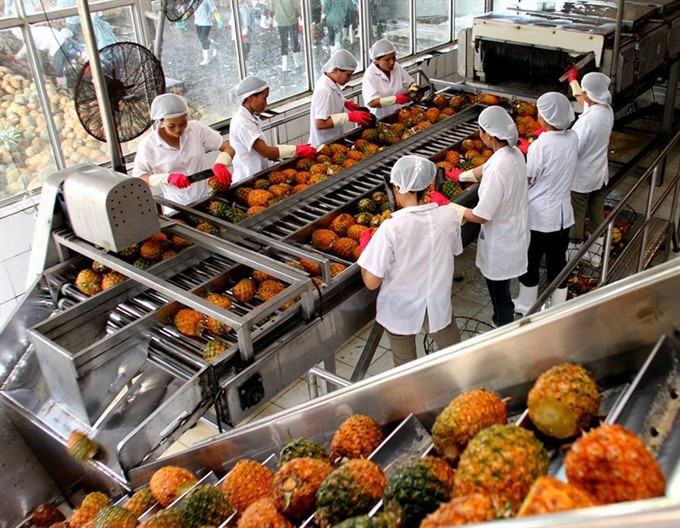(VOVworld) – With a year-on-year growth of 130%, vegetable and fruit exports have been topping Vietnam’s exports of farm produce over the past 8 months, earning 1.7 billion USD and exceeding the rice export value for the first time. The sector’s export value is expected to reach 2.5 billion USD for the whole year.
 |
| Pineapple are processed for export at Dong Giao Food Stuff Export Company in Ninh Binh province. (Photo: Huy Hung/ VNA/VNS) |
Vietnam has recently shown strong growth in fruit and vegetable exports. In 2005, Vietnam’s fruits and vegetables were available in 36 countries and territories, earning more than 235 million USD in revenue.
Now 60 countries import Vietnamese fruits, bringing in 1.8 billion USD. The growth has attracted more investors and helped farmers increase their income by applying the VietGAP or GlobalGAP standards to their production.
Giap Van Thanh of Kep 1 village in Luc Ngan district, Bac Giang province, leads a group of farmers specializing in producing safe litchi for export to the US.
“With 270 households in the village and only 6 zone codes, many households haven’t been able to participate in the project, though they have realized benefits from planting safe litchis for export. We hope litchi cultivation areas will be expanded so that all villagers and farmers in Hong Giang hamlet can benefit from the project,” said Thanh.
The vegetable and fruit sector has been trying to expand to demanding markets in the US, EU, Japan, the Republic of Korea, Canada, and Australia.
Customers in Australia and the US now have access to Vietnamese litchi and in the near future Vietnamese mango will also be available in Australia. Nguyen Tri Ngoc with the Advance International Company of the AIC Group, which specializes in exporting agricultural products and investing in high-tech agriculture, said the successful penetration of demanding markets will have double benefits. It will make domestic vegetables and fruits less dependent on a single market and encourage farmers to produce what the export markets need.
According to Ngoc, “Economic integration requires production by value chains. This creates sustainable development for Vietnam’s farm produce and stabilizes farmers’ incomes. This is very important for domestic exporters because quality is a vital factor for penetrating new markets and signing contracts with partners.”
Tran Dinh Long, Chairman of the Vietnamese Seed Association (VSA), said Vietnam has a great potential in vegetable and fruit exports and the world has a high demand for these products. Although exports are growing, the volume remains modest compared to the global demand.
Long said: “The global vegetable and fruit market is growing fast. Farmers now understand the need to apply Vietnamese Good Agriculture Practice (VietGap) standards to increase the value of agricultural products. The sector will be more successful if more high-tech businesses and research institutes providing qualified seeds get involved.”
The biggest hurdle is quarantine regulations. Le Son Ha, head of the Quarantine Section of the Department of Plant Protection under the Ministry of Agriculture and Rural Development, said: “More and more Vietnamese fruits are in markets which require high quality products. We’ll study market demand, focus on markets with high demand, and tap regional markets like ASEAN and China. For each market, we’ll put forth solutions to make exports more profitable.”